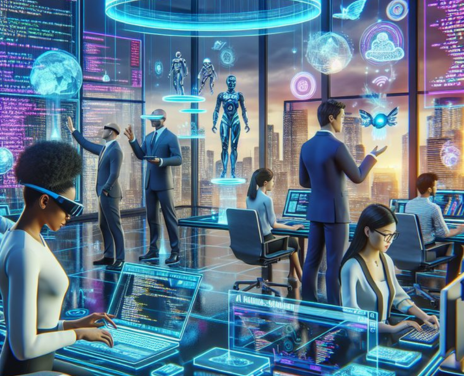Now in today’s fast moving world of digitalization, Artificial Intelligence (AI) is revolutionizing the path for Digital Inclusion in India. In this endeavour of the country to connect citizens to technology, AI makes it possible to level the distance between the developed and the developing world, assist marginalised groups, and encourage people across the nation for the economic opportunities. As millions of people dwell in low-connectivity zones across the country, AI provides exciting solutions to enhance the multi-fold connectivity for all.
1. Connectivity Solutions through Artificial Intelligence
Internet connection also is still a big issue in many areas and especially in the rural belt of India. Technologies such as DR4C (drone-based communication), reduced cost satellite internet, and data analytics are being deployed to break the digital divide in these regions. Networks can use AI algorithms to determine where towers should be built, how much demand will be, and how many bands should be utilized to provide greater efficiency and cost containment when providing connective solutions.
2. AI for Literacy and Education
Artificial intelligence in technology is also enhancing education through offering tailor made solutions in regional schools where there is dearth of learning tools. Chatbots, smart learning apps, and intelligent assistants, oriented on education, assist students to facilitate access to effective educational content, practice exercises, and instant feedback. Also, AI-based translator tools are helping overcome language barriers, thus, bringing educational resources to minorities of the multilingual population across the Indian territory.
3. Healthcare AI in Rural India
Deployment of healthcare services in the rural area of India at times faces a lot of problems as there is scarcity of cash along with poor/improper healthcare facilities. There are existing AI solutions including predictive diagnostic, telemedicine, and wearable health devices that have filled this gap. Implementing AI into the provision of health services means creating virtual consultations, interpreting health data, and diagnosing diseases in their early stages. This way, any sort of ailment gets treated on time, including those in the most hard-to-reach regions.
4. AI for Building Up Local Economy
It is also revolutionizing businesses in urban regions and developing business SMEs in rural areas to connect with the international market. Some of the benefits of AI technologies in operation include use of AI for inventory control, use of chatbots for managing customer relations and use of data analytics for decision making, allowing the SMEs to become more efficient, reduce costs and therefore compete on a larger scale. This is because they bring forth employment chances for the individuals residing locally and assist in boosting up local businesses.
5. AI-Driven Financial Inclusion

In the rural areas of the country including the Orissa state, most of the people have not been connected to the organized sector formal banking services. Financial inclusion is being made possible by facilities such as credit scoring systems, mobile money services, and natural language processing based financial advice. These solutions help people from disadvantaged areas to create accounts and carry accounts, get micro credits, perform safe online payments, and become economically more sustainable.
6. Integration of AI in service delivery in public sector
‘AI-Based Systems is making Job Delivery by the Indian Government more efficient to deliver the Government Services and Programs to the public especially to those who are far from reaching.’ From the AI Chatbots which helps one register for welfare schemes to AI based systems which helps in processing the land records and updates it, technology is making the system more transparent and eliminating the delay which is inherent in the bureaucratic system.
7. Using AI as a Tool for Developments in Digital Literacy Training
Hence, literacy must be viewed as the crucial factor in digitally excluding members of the society. Accomplished with intelligent training models, virtual classes, and use of mobile applications, people residing in rural areas of India are getting trained for digital literacy. These tools are designed according to different tempos of knowledge acquisition and preferences so that people regardless of their age and previous contact with technologies can navigate the digital economy actively.
8. Global Leadership for Ethical and Responsible AI Development of Digital Inclusion
AI is increasingly becoming a core component of any digital inclusion strategy, and it therefore becomes important for the use of this technology to be well managed. Other issues, such as data protection, accurate machine learning algorithms, and openness are crucial now to avoid negative exclusion. Governments as well as organizations and developers of artificial intelligence must develop rules and directions that will help them in the use of ethical artificial intelligence especially for the vulnerable groups.
Conclusion
AI is becoming instrumental in fostering greater digital adoption across different segments in India while improving connectivity, bringing education and healthcare services, supporting and fostering the local economy, and ensuring financial services reach out to the last mile. With winning AI strategies in the pipeline, India is slowly but surely on the way to fulfilling the dreams of a smart society in which nobody is left behind by technology.
At Aixcircle we appreciate the potential of AI in promoting and achieving inclusion and therefore are willing to support any idea that aims towards landing AI in a connected India. It’s our responsibility to make the world a better place so all people are ready for the future digital economy.


